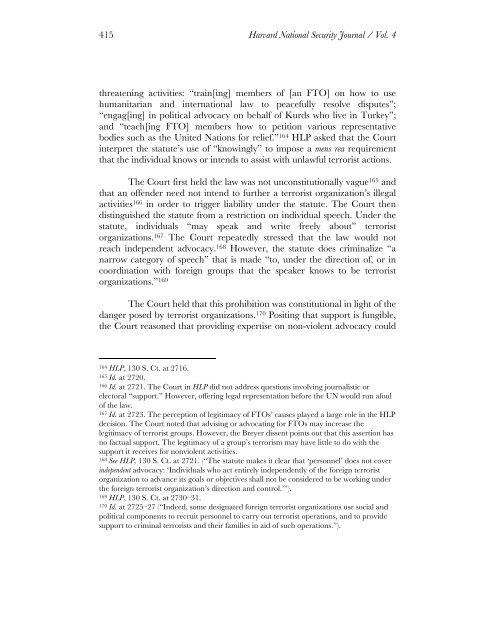Vo.4-Moshirnia-Final
Vo.4-Moshirnia-Final
Vo.4-Moshirnia-Final
Create successful ePaper yourself
Turn your PDF publications into a flip-book with our unique Google optimized e-Paper software.
415 Harvard National Security Journal / Vol. 4<br />
threatening activities: “train[ing] members of [an FTO] on how to use<br />
humanitarian and international law to peacefully resolve disputes”;<br />
“engag[ing] in political advocacy on behalf of Kurds who live in Turkey”;<br />
and “teach[ing FTO] members how to petition various representative<br />
bodies such as the United Nations for relief.” 164 HLP asked that the Court<br />
interpret the statute’s use of “knowingly” to impose a mens rea requirement<br />
that the individual knows or intends to assist with unlawful terrorist actions.<br />
The Court first held the law was not unconstitutionally vague 165 and<br />
that an offender need not intend to further a terrorist organization’s illegal<br />
activities 166 in order to trigger liability under the statute. The Court then<br />
distinguished the statute from a restriction on individual speech. Under the<br />
statute, individuals “may speak and write freely about” terrorist<br />
organizations. 167 The Court repeatedly stressed that the law would not<br />
reach independent advocacy. 168 However, the statute does criminalize “a<br />
narrow category of speech” that is made “to, under the direction of, or in<br />
coordination with foreign groups that the speaker knows to be terrorist<br />
organizations.” 169<br />
The Court held that this prohibition was constitutional in light of the<br />
danger posed by terrorist organizations. 170 Positing that support is fungible,<br />
the Court reasoned that providing expertise on non-violent advocacy could<br />
164 HLP, 130 S. Ct. at 2716.<br />
165 Id. at 2720.<br />
166 Id. at 2721. The Court in HLP did not address questions involving journalistic or<br />
electoral “support.” However, offering legal representation before the UN would run afoul<br />
of the law.<br />
167 Id. at 2723. The perception of legitimacy of FTOs’ causes played a large role in the HLP<br />
decision. The Court noted that advising or advocating for FTOs may increase the<br />
legitimacy of terrorist groups. However, the Breyer dissent points out that this assertion has<br />
no factual support. The legitimacy of a group’s terrorism may have little to do with the<br />
support it receives for nonviolent activities.<br />
168 See HLP, 130 S. Ct. at 2721. (“The statute makes it clear that ‘personnel’ does not cover<br />
independent advocacy: ‘Individuals who act entirely independently of the foreign terrorist<br />
organization to advance its goals or objectives shall not be considered to be working under<br />
the foreign terrorist organization’s direction and control.’”).<br />
169 HLP, 130 S. Ct. at 2730–31.<br />
170 Id. at 2725–27 (“Indeed, some designated foreign terrorist organizations use social and<br />
political components to recruit personnel to carry out terrorist operations, and to provide<br />
support to criminal terrorists and their families in aid of such operations.”).
















